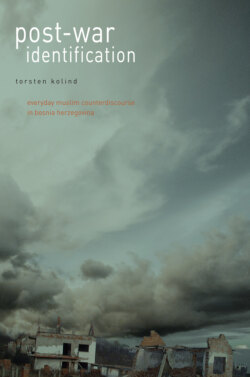Читать книгу Post-War Identification - Torsten Kolind - Страница 9
The public sphere in Stolac Institutionally
ОглавлениеAccording to several employees in the OHR, IPTF (International Police Task Force) and OSCE (Organization for Security and Cooperation in Europe) I talked to, it was very difficult to make progress in Stolac municipality, as every attempt at establishing or facilitating inter-ethnic cooperation was obstructed by hardliners in the HDZ. Furthermore, according to the same sources, there was reason to believe that heavy and well-organised criminal activity emanated from institutions, companies and groups of persons around Stolac with connections to the HDZ. Upholding the nationalist policy of ethnic separation could therefore be a way for such corrupt Croats to profit financially. I will not evaluate these presumptions; but it does make sense that a rather influential and inflexible group of Croats was trying as hard as possible to uphold ethnic division in Stolac in as many areas as possible. When I did fieldwork, Stolac was ethnically divided on all institutional levels, and intense symbolic demonstrations constantly reinforced nationalist thinking and promoted ethnic stereotypes. In short, antagonistic Croats dominated the public sphere, where they clearly communicated the message: “Croats and Muslims cannot live together.” I shall give some examples of how thorough the ethnic division and discrimination was on the institutional level at the time of my fieldwork.
All local public enterprises in Stolac had Croat directors, and they only employed Croat workers (only three Muslim men had been re-employed in their former jobs due to their much specialised skills). Croats ran the post office, the banks, the telephone company, the power supply, and the water company. As a result, Muslims used banks and post-offices in Mostar, and only a few Muslims had telephones in their homes. Furthermore, the post office only used Croatian stamps and Croatian currency (as well as DM: Deutschmarks). The municipal assembly elected in April 2000 was dominated by the HDZ and, despite the sharing of power principles laid down by the OSCE, Muslim town council members had been completely excluded from the local administration. Since the reunification of the cantonal police in the Herzegovina-Neretva canton in June 2000, the local police station had officially been multiethnic. Interethnic cooperation had in reality been very rare. Furthermore, according to the local representative of the IPTF Croats still dictated the majority of police activities and protected criminals from prosecution. He himself had to conceal his written documents on a floppy disc, as they would not be safe on his computer in his office at the police station. Since May 2000, Muslim school children had been permitted to make use of a small part of the local primary school, but classes for Muslims and Croat children were still held separately, and the secondary school as well as the school gym was for Croats only. Muslims were excluded from local public health care; the hospital built and financed with public funds before the war only treated Croats. The nearest TV antenna was turned so that it was only possible for the residents of Stolac to watch Croatian television unless they bought a satellite dish. A small town had been built on a field on the western side of Stolac, which was inhabited only by Croats. Croats occupied many Muslim houses, though the situation has improved since I left Stolac. In short, the self-proclaimed state of Herceg-Bosna was a de facto reality. In fact, in November 2000, the HDZ took the initiative to hold a referendum among Croats, in order to establish an independent state Herceg-Bosna. This referendum, which was invalid under the terms set by the OHR, was regarded by the Muslims in town as pure provocation.
